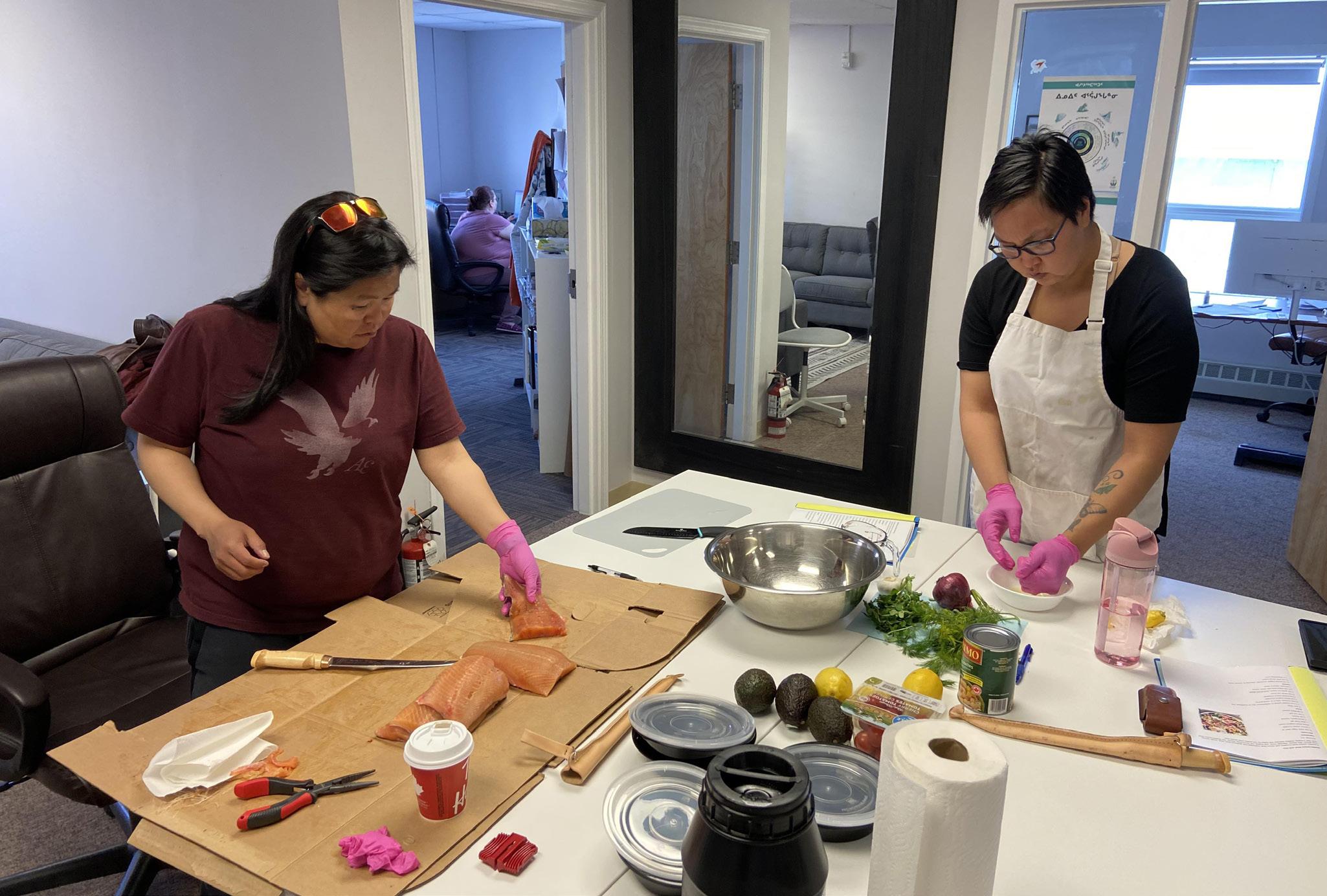
5 minute read
Former Apex resident recalls ‘beautiful’ childhood after discovering historical photograph
Mary Zinnow’s childhood pictures were destroyed in a 1960s house fire, then a 65-year-old image rekindled a flood of memories
By Tom Taylor Northern News Services
Local Journalism Initiative reporter
In May of 1968, Mary Zinnow’s family lost their home in Apex to a fire, and with it, all of their photos.
Now 78 years old, she went most her life without seeing a picture of herself as a girl, but recently came across one in a 2020 Nunavut News article.
The photo was taken in 1958, when Zinnow was a student at Apex School, a short distance from Iqaluit, which was then called Frobisher Bay and part of the Northwest Territories. The woman in the background is her old teacher, Shirley Smith, who she describes as lovely.
“I have no pictures of myself from when I was a little girl,” Zinnow said of the Library and Archives Canada photo. “I’m lucky to have that picture that we’re looking at right now.”
She was born in Frobisher Bay on July 23, 1945. She said she was the third baby born in the community. Her full name, at that time, was Mary E7-452 – the product of a Government of Canada system that identified Inuit by numbers in place of surnames.
When Zinnow discovered the photo in question, a wave of memories came flooding back.
She spent most of her childhood living in Apex. Her father worked for Hudson’s Bay Company, and they lived in a “little house” that his employer provided.
She remembers her father would trap foxes on the land around their home, and says he taught her to shoot in the springtime, when “all kinds of birds” descended on a pond near their house. Her mother, meanwhile, would take her down to the beach to collect clams, and their harvests were so bountiful that they often struggled to carry their buckets. Through it all, she recalls appreciating the natural splendour of her surroundings, from the expanses of seaweed near the beach, to the crystal clear water, to the berries that cropped up every summer.
“Oh, it was so beautiful,” she said. “We had a wonderful life.”
Zinnow has fond memories of the people in the area at the time too. There were only a few families around at that point, and she said they were all “so close to each other.”
There were also many Americans in town, working at the Frobisher Bay air base. She said the Americans were “so good” to her, and recalls attending the movies they would screen in a building next to the hospital.
She said the Americans once distributed soup and supplies to families when there was an illness spreading across town and, at other times, would give out products like coffee, bacon, peanut butter, cookies and dried apples. Once, she devoured their gifts so quickly that she made herself sick.

“We ate all of it,” she laughed. “I remember being so sick. I was throwing up.”
’The dark side of life’
Those idyllic days did not last for Zinnow, as her father eventually left his job with Hudson’s Bay Company to pursue a career as an electrician in Kingston, Ont., and she moved with her mother from their longtime home in Apex to Iqaluit, where they stayed with family.
It was around that time, she recalled, that she became aware of “the dark side of life.” By that point, alcohol had begun to seep into the community, and it affected many people around her. She also started drinking herself, and ultimately ran away from home.
She didn’t get sober until 1984.
By that time, she had married twice: first to a man from Kinngait when she was a teenager, and later to a German man she met in Montreal. She met her second husband in 1979, in the city’s East End, and later discovered that they lived right beside each other in the city centre. They married in Iqaluit a year after that happy coincidence, and she took his last name. Today, they live together outside Grande Prairie, Alta.
Zinnow has a son in his 50s and another in his 40s. She had a daughter who died in 2012, which is when she was last in Iqaluit. She admits that her drinking put a strain on her relationships with her daughter and other family members, but she hopes they know she loves them with all her heart.
ᓴᓇᖑᖅᖢᓂ ᑭᐳᖓᓂᒃ ᐃᓕᓐᓂᐊᒃᕐᕕᖕᒥᑦ ᓂᐊᖁᙴᓂ ᒪᐃ 1958. ᒥᐊᓕᐅᑉ ᐊᔨᖁᑎᑐᖃᕕᓂᖏᑦ ᐊᓯᐅᔨᓚᐅᖅᓯᒪᒐᒥᔾᔪᒃ ᐃᒡᓗ ᐃᑯᐊᓚᔪᒧᑦ, ᖁᒃᓴᓚᓚᐅᖅᖢᓂᓗ ᑕᑯᒐᒥ ᐊᔨᖁᑎᒥᒃ ᐃᖕᒥᓂ ᓇᖕᒥᓂᖅ ᓄᓇᕗᑦ ᐱᕙᓕᐊᔪᖁᑎᖏᑎᒍᑦ 2020-ᓕᓴᖅ.
A young Mary Zinnow, then known as Mary E7-452, paints a sculpture on her desk at school in Apex in May 1958. Mary lost most her childhood photos in a house fire, and was delighted to discover this one by chance in a Nunavut News article from 2020. Photo courtesy of Ted Grant/ National Film Board of Canada Phototheque Collection/Library and Archives Canada/e010975839
“When I was young, I was confused,” she said. “I have regrets.
“I’m thankful for my family. They’ve gone through a lot with me.”
She said her life “has been much better” since she got sober, and that she’s happy in Grande Prairie. She learned to garden. She goes to church. She volunteers on National Indigenous Peoples Day and Canada Day. She gives presentations on her life in Nunavut at a local school.

“Life is good here,” she said. “I have a good life.”
Despite being thousands of kilometres from Iqaluit, she’s still immensely proud of her Inuit heritage. Stumbling across a photo from her childhood in Apex helped reinforce that pride, and she hopes sharing her story will ensure that others don’t forget how people in the area used to live.
“A lot of things were coming to my mind [when I saw the photo]” she said, fighting back tears. “God is good to me. God loves me and he doesn’t forget who I am.
“I’m Inuk and nobody can change it,” she added. “I don’t want it to get lost, how we used to live in the past.
“There was harmony, there was peace, there was respect, and there was love.”
Published Mondays
Office: 626 Tumiit Plaza, Iqaluit, NU
Box 28, X0A 0H0
Reporter: Tom Taylor
Translator: Jeannie Angilirq
Advertising:
Phone: (867) 979-5990
Fax: (867) 979-6010
Toll free: (855) 447-2584
Email: editor@nunavutnews.com
Website: www.nunavutnews.com
Kivalliq office: Box 657, Rankin Inlet, NU, X0C 0GO
Phone: (867) 645-2862
Email: kivalliqnews@nnsl.com
Website: www.nnsl.com/kivalliqnews
Production facilities: Box 2820, Yellowknife, NT, X1A 2R1
Phone: (867) 873-4031
Fax: (867) 873-8507
Email: editorial@nnsl.com advertising@nunavutnews.com circulation@nnsl.com
Website: www.nnsl.com
FOUNDER (1934-2018): J.W. (Sig) Sigvaldason GROUP PUBLISHER
Mike W. Bryant – mike.bryant@nnsl.com
MANAGING EDITOR
James McCarthy – james.mccarthy@nnsl.com

ACCOUNTING: receivables@nnsl.com
Sophie Wu
EDITORIAL BOARD:
Mike W. Bryant • James McCarthy
Derek Neary
NEWS EDITORS
James McCarthy
• Derek Neary • Sean Murphy
EDITORIAL PRODUCTION: editor@nunavutnews.com
Sports: sports@nnsl.com
ADVERTISING PRODUCTION
Production manager: Jennifer Reyes
ADVERTISING advertising@nunavutnews.com
All departments: advertising@nnsl.com
National: James Boylan
Classified Advertising: classifieds@nnsl.com
Director of product development: Laura Whittle
Admin ad controller: Liezrie Maala
CIRCULATION – circulation@nnsl.com
Circulation Director: Edison Mathew
Circulation clerk: Bill Hutchinson
Subscriptions: One year mail $75
Online (entire content) $50/year
NNSL Media, a division of Black Press Media
Publishers of: Inuvik Drum • Kivalliq News
Yellowknifer • Hay River Hub NWT News/North • Nunavut News/North
We acknowledge the financial support of the Government of Canada.
Nous reconnaissons l'appui financier du gouvernement du Canada.

Member of the Ontario Press Council. The Ontario Press Council was created to defend freedom of the press on behalf of the public and press alike and to consider specific, unsatisfied complaints from readers about the conduct of the press in gathering and publishing news, opinion and advertising.
Complaints should go to: The Ontario Press Council, 2 Carlton St., Suite 1706 Toronto, Ont., M5B 1J3
Email: Info@ontpress.com Fax: 1-416-340-8724 www.ontpress.com
SEND US YOUR COMMENTS
Email us at: editorial@nnsl.com; mail to Box 28, Iqaluit, NU, X0A 0H0; or drop your letter off at our office at 102 Tumiit Plaza. All letters submitted must be signed with a return address and daytime telephone number so that we can confirm it came from you.
Not all letters will necessarily be published.
Preference is given to short letters of broad interest or concern. Letters of more than 200 words, open letters and those published elsewhere are seldom used.
We reserve the right to edit for length or taste and to eliminate inaccurate or libelous statements.







